When you purchase through links on our site, we may earn an affiliate commission.Heres how it works.
Its a debate with little consensus but which permeates almost every aspect of society.
The law is not immune.

On first examination, theres certainly potential for AI to create a less biased justice system.
Clearly, the criminal justice system does not truly work for all.
AI-led proceedings would not require the empaneling of juries.
And, if algorithms were continuously updated and improved over time, human bias could be significantly reduced.
Some would suggest this goes too far.
For example, in the handling and recording of data.
How is it already being used?
Some countries around the world are already trialing the technology in their judicial systems, with considerable success.
China is using Xiao Zhi 3.0 (Little Wisdom') to aid legal decision making in civil proceedings.
But could we ever rely on AI to completely take the reins when it comes to doling out justice?
AI is not programed to reach a binary conclusion, it learns from scenarios and applying its own conclusions.
These scenarios arent predefined the program just figures out what to do.
Thats a lot of trust to place in the hands of technology.
Sceptics would argue that it will never be able to truly possess common sense.
It can produce human aligned responses, sure.
But it lacks the intuitive understanding of humans.
Can AI experience empathy and a true sense of justice?
Then there is the skillset of our existing judges and senior lawyers.
Many of these are more luddite than technophile and pose a stumbling block to initial implementation.
Before long, they may, in fact, face trial by AI.
We’ve featured the best AI writers.